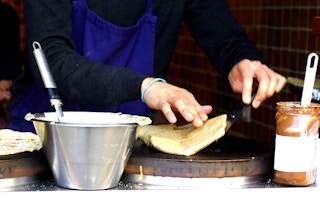France’s National Assembly is due to vote by Thursday on a proposed additional tax on palm oil, a move that has prompted an outcry from top producers Indonesia and Malaysia who call it discriminatory and unfair.
The proposed additional levy, aimed at reflecting the environmental damage palm oil plantations can cause, has been cut to 90 euros per tonne from 300 euros initially, but would still nearly double the current vegetable oil tax of 104 euros.
Producers who can prove that the oils they use meet the “criteria of environmental sustainability” would be exempt.
The amendments are part of a wider biodiversity bill expected to be adopted on Friday.
The additional levy would also apply to copra (coconut) and palm kernel oil, also commonly used in commercial cooking, which are currently taxed at 113 euros a tonne.
The tax would only apply to oils used in food, not cosmetics and biofuels - two sectors in which vegetable oils are widely used.
Producers in Indonesia and Malaysia, the world’s two largest producers, protested ahead of the vote.
“French imports are not that big, but the issue is that if this goes out there might be repercussions in other counties,” Roy Lim, group plantations director of Malaysian palm oil firm Kuala Lumpur Kepong (KLK), said.
Indonesia raised the issue at the World Trade Organisation earlier this month.
France imports about 100,000 tonnes of Indonesian palm oil per year and 11,000 tonnes of Malaysian palm oil last year.
Nutella tax
This is not the first attempt by French lawmakers to impose a tax on palm oil which campaigners say contributes to deforestation and impacts biodiversity. The first one, in 2012, suggested to quadruple the tax on palm oil.
Previous attempts have failed, mainly due to strong lobbying from producing countries.
Past proposals were dubbed as a “Nutella tax” by the French media because the popular chocolate-hazelnut paste which contains about 20 per cent palm oil.
However, since 2013, Nutella has been made exclusively with palm oil from sustainable supplies, the maker, privately-owned Ferrero, says. That would make Nutella exempt under the terms of the current proposal - the first to differentiate on that basis.
Strong public opposition against palm oil in France, also amid fears that its high level of saturated fat could be harmful to human health, has prompted several supermarkets in the country to commit to ban the use of palm oil in their own-brand products by the end of the decade.
Even if passed this week the tax could still be changed in the upper house, where the law should be re-examined in May or June. If it is again rejected, there will be a joint committee of the two houses to try and find a compromise. A new vote would then take place in June or July in the National Assembly, which according to French law has the final say.

















